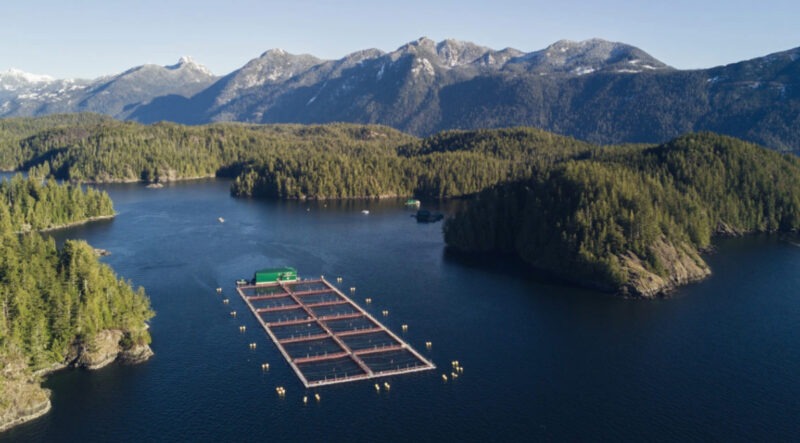Activists ratchet up campaign of misinformation about salmon aquaculture
Billboards containing false information about salmon farms removed in Ottawa while anti-aquaculture activists in British Columbia regurgitate old incidental bycatch data.
By Fabian Dawson
SeaWestNews
Anti-aquaculture activists, who have been raising hundreds of thousands of dollars in public donations to fund their campaign of misinformation targeting salmon farmers in British Columbia, have had their billboards around Ottawa removed.
The billboards by the activists were aimed to influence federal politicians to stop salmon farming on Canada’s West Coast, even as government scientific findings and court rulings have determined the marine aquaculture operations pose less than a minimal risk to wild fish stocks.
“In an age of misinformation, we are pleased that the right thing happened – false ads that did not stand up to the truth test were removed,” said Tim Kennedy, President and CEO of the Canadian Aquaculture Industry Alliance (CAIA).
“Activists with deep pockets who don’t live or work where our salmon farmers live and work are trying to drive policy decisions in Ottawa that would cancel people’s livelihoods using a storyline based on old data and false information,” he said.
The false statements on the billboards included claims from eco-activist group Wild First that “open-net pen salmon farms are banned in Washington, Oregon, California, and Alaska.”
Based on this inaccurate information, the ads called on Ottawa to “remove all salmon farms from B.C. waters.”
A letter of complaint filed by CAIA provided clear evidence that the farming of finfish (including salmon) is not banned in California, Oregon, or Washington. In Alaska, net pens are commonly used to raise salmon for commercial purposes.
“These anti-salmon billboards included statements by the activist group Wild First that were both false and potentially economically harmful to British Columbia businesses and organizations and their employees that the Canadian Aquaculture Industry Alliance represents,” said Kennedy.
“Modern, sustainable, in-ocean salmon aquaculture is the second biggest agri-food export in British Columbia and key to the blue economy future for people living in rural, coastal and Indigenous communities.”
The billboard removals follow another exercise in fearmongering against salmon farmers by the Watershed Watch Salmon Society, which is also actively seeking public donations to kill an industry that employs approximately 6,500 people.
The group this week regurgitated an old report about an incidental herring bycatch incident at Cermaq Canada’s farms on the west coast of Vancouver Island.
The incident was originally reported last year to the Department of Fisheries and Oceans (DFO) and the Ahousaht First Nation , with whom Cermaq has an agreement to farm salmon in its traditional territory.
“This incident coincided with an unprecedented increase of wild herring biomass near our farms on the west coast of Vancouver Island. It was identified as an area that required immediate and effective action from our company, led by the oversight and objectives of our Indigenous partners,” said Cermaq Canada in a statement.
“Cermaq Canada has worked collaboratively with the Ahousaht First Nation, through objectives set out in our protocol agreement, to address this incident to great effect. As a result, incidental Pacific herring catch in 2023 has seen a 94.6% reduction over 2022.
“It has been disappointing to see this incident brought into an unbalanced media spotlight – which omitted the positive results of 2023 – almost two years after it was reported to the DFO, as is a requirement under our Conditions of License, as well as immediately reported to the Ahousaht First Nation in whose territory we operate.”
DFO has said the Cermaq Canada incident would not likely have a negative long-term impact on the herring in the region.
“These mortalities represent a very small proportion (less than 0.01%) of the estimated juvenile herring population on the West Coast of Vancouver Island and is unlikely to have an impact on the population in future years,” DFO said.
The BC Salmon Farmers Association (BCSFA) said incidental bycatch data has been publicly available on DFO’s website for a decade.
“There was a spike in incidental catch in 2022 that was a company specific single year issue…it is not a sector wide on-going issue,” the association said.
While spreading falsehoods about salmon farmers has long been a part of the anti-fish farming lobby, they have recently ratcheted up their tactics fearing new Fisheries Minister, Diane Lebouthillier, will opt to let science instead of their unfounded claims dictate the future of marine aquaculture in British Columbia.
Last summer, the activists used the world-wide abundance of Pink Salmon to push false narratives that the high returns – also recorded in British Columbia – are due to closures of open-net aquaculture operations on Canada’s west coast.
Cherry-picking data to confuse the public and hog the headlines, the activists ignored the fact that Pink Salmon runs were booming everywhere regardless of whether salmon farms are active or not.
This resulted in a TV station having to remove a news segment that contained numerous false claims by an anti-salmon farming campaigner.
The activists’ latest media blitz comes in the wake of the Coller FAIRR Protein Producer Index, that ranks companies in responsible food production, found salmon farmers produce the most sustainable animal protein in the world.
(A salmon farm in BC. Image courtesy of Cermaq Canada)

